AWITC – Last chance for early bird registration and poster abstract submission
Vintage research trials now in tank
Leafroll virus – your questions answered
Trial explores breadth of Chardonnay winemaking options
New eBooks – from packaging to natural wines
Discover the latest in grape sorting technology
AWITC – Last chance for early bird registration and poster abstract submission |
|
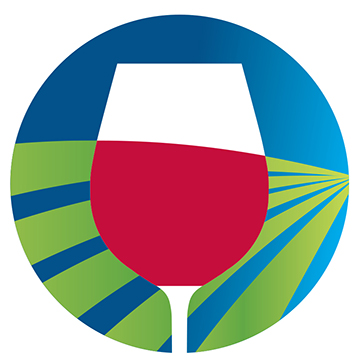 |
Friday, 12 April is the last day for 17th AWITC registrations at early bird pricing and the deadline for submission of poster abstracts. Submit your abstract before the deadline to be in the running to present in the ‘Fresh Science’ sessions in the plenary program or in the student forum, and register by midnight on Friday to save $200 on a standard registration. |
Vintage research trials now in tank |
|
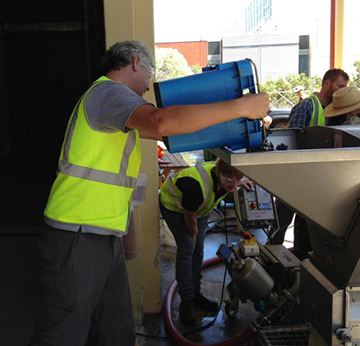 |
As vintage winds up across much of Australia, AWRI researchers are also starting to pack up their high vis vests and safety boots, as they finalise a range of vintage trials. Such trials form a key part of AWRI research, as the once-a-year opportunity to conduct experiments at a larger scale using freshly picked grapes. This year’s trials have covered a wide variety of topics across wine flavour chemistry, wine microbiology and process improvement. Sincere thanks go to the many industry collaborators who have generously provided access to experimental vineyard sites, grapes, wines and other facilities – without their contributions these research projects would not be possible.
AWRI bioscience researchers are trialling a yeast that produces high levels of ‘rose’ flavour in sparkling wine production for the first time, finding out what happens when you aerate a wild ferment and adding glutathione prior to fermentation to both sparkling base and still Chardonnay wine. Work on oxygen/aeration is also continuing, with trials looking at dose effects and the use of pulse air devices to get air into ferments. The flavour chemists are investigating ‘jammy’ overripe flavours in Shiraz, clonal effects on ‘apricot’ characters in Viognier and effects of shading treatments on aged characters in Riesling. They have also been collecting grapes for studies examining ripening effects on aroma compounds in Shiraz and grape marc for work on flavour precursors. Smoke taint researchers undertook a mammoth task of ‘smoking’ tonnes of grapes and then making wine from them for use in remediation experiments. The work doesn’t end here, with, bottling, analysis and tastings to come throughout the year. Results from these projects and more will be published as they become available; however, if you’d like to know more about any of these trials, please get in touch. |
Leafroll virus – your questions answeredIn the past year the AWRI helpdesk has received queries from some regions that are concerned about grapevine leafroll virus type 3 (GLRaV-3). Awareness of the impact of viruses in viticulture is growing in Australia, and there is a need to better understand their spread and the levels of infection that require action. In a recent ‘Ask the AWRI’ column, published in Australian & New Zealand Grapegrower and Winemaker, Senior Viticulturist Marcel Essling tackled some of the most common questions about leafroll viruses, including symptoms, vectors involved in their spread and testing options. Read the column in full here. In addition, AWRI Commercial Services provides grapevine virus testing and elimination services – details are available from the virus testing page of the AWRI website. |
|
Artist in residence announced |
|
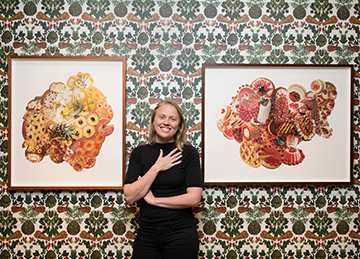 |
Brisbane-based artist Elizabeth Willing has been announced as the AWRI’s very first artist in residence! In a new art + science residency made possible by the Australian Network for Art and Technology, Elizabeth will spend three months in stages embedded at the AWRI, working with the sensory and flavour team. During her residency Elizabeth will consider the synesthetic harmony between the flavour of wines and the visual aesthetics of still and moving images. Elizabeth’s art explores the sculptural and multisensory potential of food. Her work includes sculpture, installation, performance and participatory dining events that engage audiences through smell, taste, and touch. To see some of Elizabeth’s art, visit her website https://elizabethwilling.com/. |
Trial explores breadth of Chardonnay winemaking options |
|
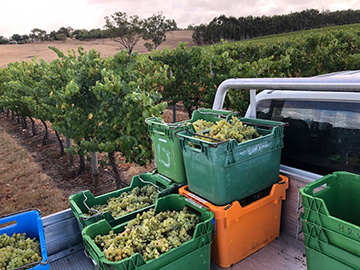 |
For the past four vintages, the AWRI has conducted a winemaking treatment trial, evaluating the effect of different winemaking techniques on a single batch of fruit, and then taking the wines on the road in tasting workshops. This year, for the first time, the trial is of a white variety – Chardonnay – and it has been designed to explore some of the many techniques Chardonnay winemakers have available to choose from. The fruit for this year’s trial was hand harvested from a vineyard close to Woodside in the Adelaide Hills between 5 and 12 March, and although the crop level was down, the fruit was in very good condition. Sixteen winemaking treatments are currently in progress with a focus on the two main processing techniques of whole bunch pressing and crushing/destemming as well as treatments including varying solids levels, skin contact, low sulfur, different yeast strains and different temperatures.
The winemaking treatments included in the trial were carefully determined in consultation with a number of Australia’s leading Chardonnay producers, and where possible, have been tailored to complement previous and current AWRI research projects. The aims of the trial are to illustrate the sensory effects of applying certain research outcomes during winemaking, and to provide advice on the practical application of those research outcomes in a commercial setting. The wines will form part of the AWRI’s extension program and be presented across Australia in pre-vintage roadshow workshops, in late 2019 and early 2020. For more information about the trial, contact the AWRI helpdesk on helpdesk@awri.com.au. |
New eBooks – from packaging to natural winesEight new titles have recently been added to the AWRI’s Grape and Wine eBook Collection.
Access to the collection is reserved for Australian growers and winemakers who pay the Grape Research or Winegrape levy. Existing AWRI account holders need only sign in. New users can register for an account here. For assistance with using the collection, please contact the AWRI information services team. |
|
AWITC workshops |
|
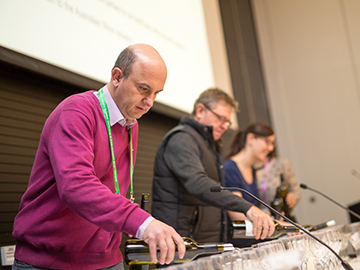 |
The 17th Australian Wine Industry Technical Conference is now just over three months away. A key component of the conference is the workshop program – which offers delegates the opportunity to delve into a chosen topic in detail, hear from experts, ask questions and learn from other participants. This year’s AWITC workshop program, coordinated by Con Simos and Francesca Blefari, is being held entirely on Sunday 21 July to ensure no clashes with the plenary program or other conference activities. A total of 34 workshops will be presented on topics across viticulture, winemaking, business, sensory science and health/regulatory matters, with many of the workshops featuring tastings. The workshop schedule and abstracts can be found on the conference webpage. Register now at http://www.awitc.com.au/registration to lock in your preferred sessions.
Some workshop topics to consider include:
For more information on the workshop program, contact Con Simos and Francesca Blefari at workshops@awitc.com.au or +61 (0)8 8313 6600. |
Discover the latest in grape sorting technologyGrape sorting is an area where new technologies are having a significant impact on winemaking. A recent article by Simon Nordestgaard published in Australian & New Zealand Grapegrower & Winemaker reviews the latest developments in grape sorting and can be viewed here. A workshop on grape sorting will also be held at the 17th AWITC on 21 July. This workshop will include presentations from winemakers who have used different sorting technologies and tastings of wines made with and without grape sorting. Visit the AWITC workshops page to learn more. |
|
Order the latest AWRI staff publications onlineAccessing the latest AWRI publications is easy. Visit the AWRI Publications web page to:
A list of AWRI publications published since the last eNews is included below: 2071 van der Hulst, L., Munguia, P., Culbert, J.A., Ford, C.M., Burton, R.A., Wilkinson, K.L. Accumulation of volatile phenol glycoconjugates in grapes following grapevine exposure to smoke and potential mitigation of smoke taint by foliar application of kaolin. Planta 249 (3): 941-952; 2019. 2072 Day, M., Schmidt, S.A., Pearson, W., Kolouchova, R., Smith, P.A. Effect of passive oxygen exposure during pressing and handling on the chemical and sensory attributes of Chardonnay wine. Aust. J. Grape Wine Res. doi: 10.1111/ajgw.12384; 2019. 2073 Parker, M. Barker, A., Black, C.A., Hixson, J., Williamson, P., Francis, I.L. Don’t miss the marc: phenolic-free glycosides from white grape marc increase flavour of wine. Aust. J. Grape Wine Res. doi: 10.1111/ajgw.12390; 2019. 2074 Taylor, A., Barlow, N., Day, M.P., Hill, S., Martin, N., Patriarca, M. Atomic spectrometry update: review of advances in the analysis of clinical and biological materials, foods and beverages. J. Anal. At. Spectrom. 34(3): 426-459; 2019. 2075 Cordente, A.G., Borneman, A.R., Bartel, C., Capone, D., Solomon, M., Roach, M., Curtin, C.D. Inactivating mutations in Irc7p are common in wine yeasts, attenuating carbon-sulfur beta-lyase activity and volatile sulfur compound production. Appl. Environ. Microbiol. 85 (6): e02684-18; 2019. 2076 Essling, M. Ask the AWRI: Leafroll viruses – what you need to know. Aust. N.Z. Grapegrower Winemaker (662): 35-36; 2019. 2077 Nordestgaard, S. Latest advance in grape sorting technology. Aust. N.Z. Grapegrower Winemaker (662): 50-55; 2019. 2078 Johnson, D. Seventeen times with feeling. WBM (March/April): p. 6; 2019. |
|
AcknowledgementsThe AWRI acknowledges support from Australia’s grapegrowers and winemakers through their investment body, Wine Australia, with matching funds from the Australian Government. The AWRI is a member of the Wine Innovation Cluster in Adelaide, South Australia. |
|

